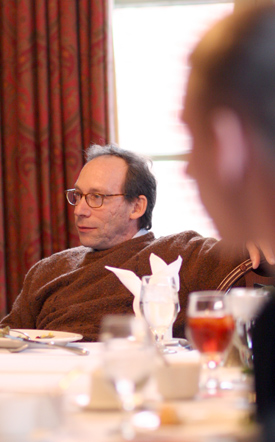Through a variety of endowments and special funds, Wabash is privileged to bring a variety of different lecturers to campus. However, it is very rare that Wabash is able to bring someone of such stature as Phi Beta Kappa Visiting Scholar, Dr. Lawrence Krauss. On Monday, he gave an evening lecture entitled, "Science, Non-Science, and Nonsense: From Aliens to Creationism" in which he discussed a variety of topics ranging from the status of science in American high schools to the interaction between religion and science.
 Wabash Professor of Physics Dr. Dennis Krause introduced the evening’s speaker. He explained to the audience that Krauss is the author of over 200 scientific publications, as well as numerous popular books. In addition to his many prestigious awards and scientific works, he is widely known for his ability to make complex science accessible to the general public. He has also alternatively served as a judge in the Sundance film festival and been nominated for a Grammy.
Wabash Professor of Physics Dr. Dennis Krause introduced the evening’s speaker. He explained to the audience that Krauss is the author of over 200 scientific publications, as well as numerous popular books. In addition to his many prestigious awards and scientific works, he is widely known for his ability to make complex science accessible to the general public. He has also alternatively served as a judge in the Sundance film festival and been nominated for a Grammy.
To begin, Krauss began to very animatedly declare that "science in America is in disarray." As way of proof, Krauss related that "only 47 percent of American adults knew that dinosaurs had died before humans appeared on Earth." Going on, he stated that a stunning "50 percent of adults did not know that the Earth orbits the sun and that it takes one year to finish this process."
After relating those facts, Krauss began to discuss who was to blame for what he saw as a dismal failure to educate our country on basic science. "One reason," he said "is that journalists are trained to look for two sides to every story. But in science, one side is simply wrong."
Krauss also blamed high school teachers "many of whom hadn’t had a science class since high school." He also pointed to a typical science catalog that gets sent to teachers. Along with a credible video from the National Geographic Society, Krauss pointed out videos about aliens, the Loch Ness monster and other spurious scientific claims.
With all the sources of misinformation, Krauss suggested a method to distinguish fact from bunk. "There are some things you don’t have to debate. Some things we know. It’s over." When evaluating a claim, it’s important to decide whether "there is something I know about the world that tells me that this can’t be true." It is important that we seek the truth, Krauss explained, because "when truth is allowed to be blurred with impunity, we jeopardize the very basis of a healthy democratic society." In fact, he continued, the ethos of science is "honesty, full disclosure, and anti-authoritarianism."
To illustrate his point, he discussed a variety of examples where the current Administration and current Congress have edited reports or spun research in a more positive light. Krauss reacted strongly to this interaction of politics and science.
"We are censoring reports," he said loudly, "based on dogmatic reasons and is harming our children."
He then went through a variety of examples to demonstrate the tension between religion and science. He mentioned a variety of examples ranging from the Taliban’s destruction of ancient Buddhist statues to a quote by Tom DeLay which seemed to suggest that the Columbine shootings were a result of the teaching of evolution in class.
That last example led Krauss to discuss the emergence of intelligent design theory, which he described as "simply opposed to evolution." He criticized religious persons who refuse to accept scientific facts, seeking to replace the way the world is for the way they would like it to be. For such persons, Krauss declared, "science is immoral because God does not play an explicit role."
Krauss criticized the "marketing efforts" of ID proponents. Appealing to people’s sense of fairness, proponents demand that ID be taught in schools along with evolution. Krauss dismissed this suggestion, suggesting that advocates of ID were "seeking to short circuit the scientific process."
"The purpose of education," Krauss declared, "is to overcome ignorance, not validate it."
Furthermore, he suggested that much of the modern tension between religion and science or science and politics is because people are afraid of science. But Krauss explained, "Science is not the enemy, ignorance is the issue."
There were a variety of reactions to the lecture among the packed Salter hall. Overall, however, audience members were pleased with the lecture. "It was both illuminating and enlightening," said Clifford Hull ’11. Senior Biology major Andrew Rodenbarger agreed, "I thought it was pretty good. However, he didn’t really comment on anything that could be disagreed with. He stuck to the facts."
Krauss will give a noontime lecture on Tuesday in Baxter Hall 101 entitled "Einstein’s Biggest Blunder?: A Cosmic Mystery Story."
Photos: Photos are of Krauss during a Monday luncheon with students.